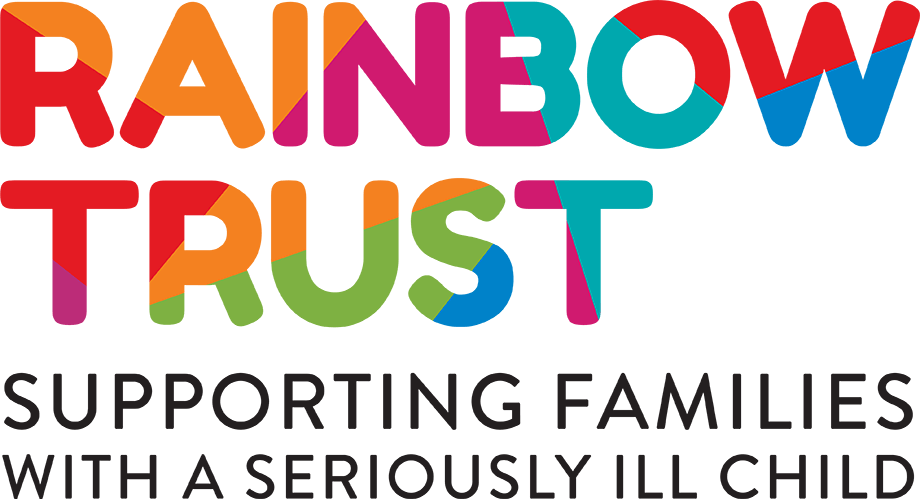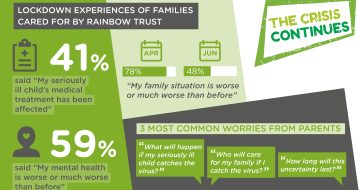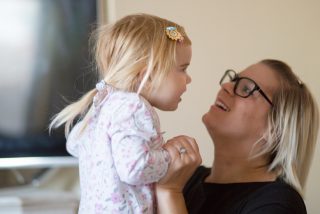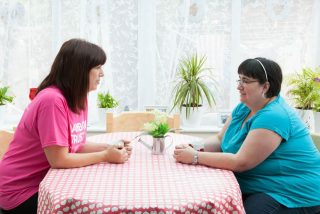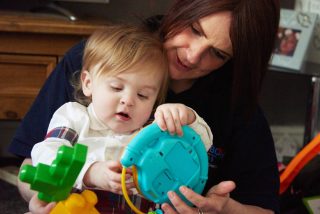Date published: 22 June 2020 by Claire Coussins
As the lockdown restrictions are starting to ease and the reported rate of Covid-19 infections and related deaths declines, the crisis is far from over for families supported by Rainbow Trust.
Many families caring for a seriously ill child are feeling even more isolated and forgotten in lockdown. Isolation and loneliness are all too familiar feelings for these families, and the pandemic gave others an insight into what life is like living in a daily crisis. Now, as the world moves towards a new ‘normal’ and restrictions ease, these families remain in anxious - some facing a worse situation than they were in before.
The media haven’t paid them, or the issues they face, much attention. Official guidance and communication has been confusing, and discussion about the return to school hasn’t included those who must shield for their own health or that of their sibling. Many of the services that families have previously accessed, both health and social care, have fallen away or changed significantly, once again, leaving families feeling anxious and forgotten.
We are concerned about the lasting ripple effect that will be left with them for weeks, months and years to come.
What they have told us
We conducted snapshot surveys in April and in June with families supported by Rainbow Trust, and this has confirmed that for them, the crisis continues.
41% of those who responded reported that their child’s medical treatment has been affected. They are carrying the burden of prolonged uncertainty caused by the cancellation or delay of appointments. For those whose treatment has still gone ahead, parents have had to balance even higher risk than usual, knowing their already extremely vulnerable child is in a medical or hospital setting with the worry of the virus. And even where appointments were conducted by phone or video, in the ‘safety’ of their own homes, away from public and medical settings, many still worried about the implications that a reduction in routine and face to face check-ups could have on their child’s illness.
As well as coping with cancelled or postponed medical appointments and treatment, many parents are reporting that their mental health has got worse, and that both parents and children feel isolated as they care for a seriously ill child round the clock.
Just under 60% of parents who responded told us that their mental health is either worse or much worse than before the pandemic and lockdown. Back in April, just under 80% said that their family situations were worse or much worse than before, and whilst the outlook has improved slightly with 48% saying the same in June, this is still very worrying.
Social distancing means that many families have lost their usual support networks of friends and family while they shield. Communities who originally rallied around when the pandemic first hit are now starting to return to normal.
For half of the families who responded, Rainbow Trust is either the only or one of two sources of support.
For the most vulnerable, they tell us that they are worried they will be forgotten. They are frightened to go out or to go back to work, or even to hospital for vital treatment. They tell us that until they know they are safe from the virus, nothing will change. Whilst this feeling is not uncommon across the country, the anxiety felt by those with a seriously ill child is undoubtedly magnified.
Don’t leave them behind
We urge the government and NHS England to listen to the needs of the many thousands of families currently caring for a child with a life-threatening or terminal condition, and to put in place the support and services which they need both now and going forward.
- NHS England should listen to and recognise the particular needs of these families in future changes to official guidance on shielding so that parents have clear and timely information about how to keep their child safe.
- The Department for Education must put in place plans to support both the education and mental health of the thousands of children who must continue to shield for medical reasons, along with their healthy siblings, while their peers return to school.
- The Department for Health and Social Care should act quickly to make available sustainable statutory funding for providers of vital emotional and practical support and community palliative care, like Rainbow Trust, who are routinely excluded from clinical funding streams and whose fundraising has been significantly affected by the pandemic.
Adapting our support
Some families supported by Rainbow Trust may now feel able to leave their homes for short periods, and we are adapting our service again in light of the new guidance. We are now offering socially distanced contact with children outdoors, socially distanced contact with parents out of doors, and in certain circumstances, support in the family home if possible. For those continuing to shield or self-isolate, Family Support Workers will continue to carry out vital practical tasks such as shopping and medication collection to support these most vulnerable families in the way they need it most.
Although it will not be possible to see every family face to face, Family Support workers will remain in contact by phone or text to ensure that all families have a regular welfare check in and to offer any help appropriate.
We would like to say a heartfelt thanks to all our supporters who have helped us deliver this critical support by donating to our emergency appeal. Your ongoing regular support will mean we can continue to respond to the evolving need and adapt our service to help these families in crisis.

For online donations outside of the UK, please use PayPal.
